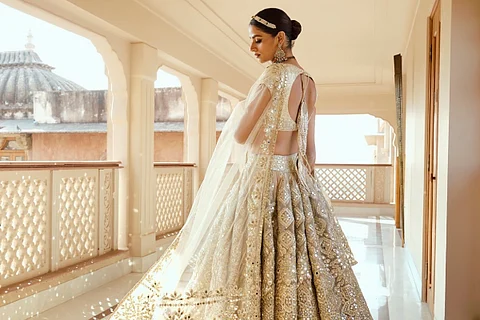
- HOME
- TRENDING
- PEOPLE
- COMMUNITY
- LIFESTYLE
- OUR PUBLICATIONSOUR PUBLICATIONS
- MASALA RECOMMENDS
- MASALAWEDS

The first person who comes to my mind when I think about eco-friendly and stylish bridal attire is Sanjana Rishi (aka @Sanjrishi on Instagram). She ditched the traditional lehenga or saree and wore a pre-loved vintage suit made in the 1990s by Italian designer Gianfranco Ferré. It was an extremely bold move for an Indian wedding, and she not only broke traditional norms by not wearing something new, but she also made a unique style statement in a pantsuit, which is very unusual for a bride.
I am happy that there is a lot more awareness about eco-conscious bridal fashion in 2025, and it has definitely become easier for brides who want to make the choice to wear a zero-waste outfit. My 17-year-old daughter and I were discussing that if and when she decides to get married, she would love to wear her grandma’s wedding saree or my wedding saree. There is already so much existing on the planet, and we can create beautiful vintage fashion statements in them.
Here are some simple and easy ways you can be the next eco-friendly bridal fashionista:
Renting
Bangkok has rental options for Indian wear, you can go try the outfit and also request them to do the fitting as per your requirement. There is a wide range of selection for rental and this is an easy option for anyone who does not have time to upcycle or get an outfit custom made from old sarees.
Wearing Heirlooms
When we go through the closets of our moms and other close relatives, we will definitely find outfits that we love. If it is a saree, you can try and get a blouse alone custom-made to your personal style and the same can be done with a lehenga. In a lot of cases, it can be worn as they are with minimum fitting. My younger daughter wore a lehenga from my wedding collection for a wedding recently with minimum adjustments. My older daughter wore a few of my sarees, I didn’t cut the saree, I just requested the tailor to pre-stitch the pleats and add a skirt so she could put it on like a ready-made saree. This created zero waste and the outfits looked beautiful on both of them.
Up-Cycling
If you find sarees in your mom’s wardrobe and you are not someone who likes to wear a saree, you can convert it into a gown or anything you like. It is easy to find local tailor in Bangkok who will custom-make it for you. There is a variety of design options to choose from, a simple Pinterest search will give you many ideas.
Choose Vintage
There are many physical and online stores for vintage bridal fashion. There are also many Indian designer outfits that you can buy second-hand now. A simple Google search will give you many options. Two names I came across recently for pre-loved and vintage Indian bridal fashion are Saritoria and Kuro.
Custom Making From Sustainable Fabric
If all of the above options are not convenient for you, you can choose sustainable fabrics like linen, hemp, plant-based silk, etc., and try and get an artisan to do embroidery work on it and stitch it into an outfit you can repeat multiple times. Once again, there are so many design options you can create depending on your personal style and when you choose a light sustainable, and breathable fabric, you will surely be able to use it multiple times over the years in warm and sunny climatic conditions similar to the weather in Bangkok. A fabric like hemp is thermos-regulating, and it will also keep you warm in winter. But if you choose a fabric that is not thermos-regulating, you can always use it with a shawl in cold temperatures.
Choose Handlooms
If you choose to buy something new, opt for handlooms. There are so many different handloom communities across India, and you can choose any type of weaving you like and source it directly from the weaver. Choose a saree that you see yourself reusing and repeating multiple times. Handlooms, as the name suggests, require no fossil fuel energy and have a minimal carbon footprint, and equally important, buying directly also empowers the weaver.
Aparna Sharma is a non-conformist who believes that fashion must become a force for good and style must meet sustainability. She breaks down the nuances of slow fashion and how we can stay stylish without being trendy.